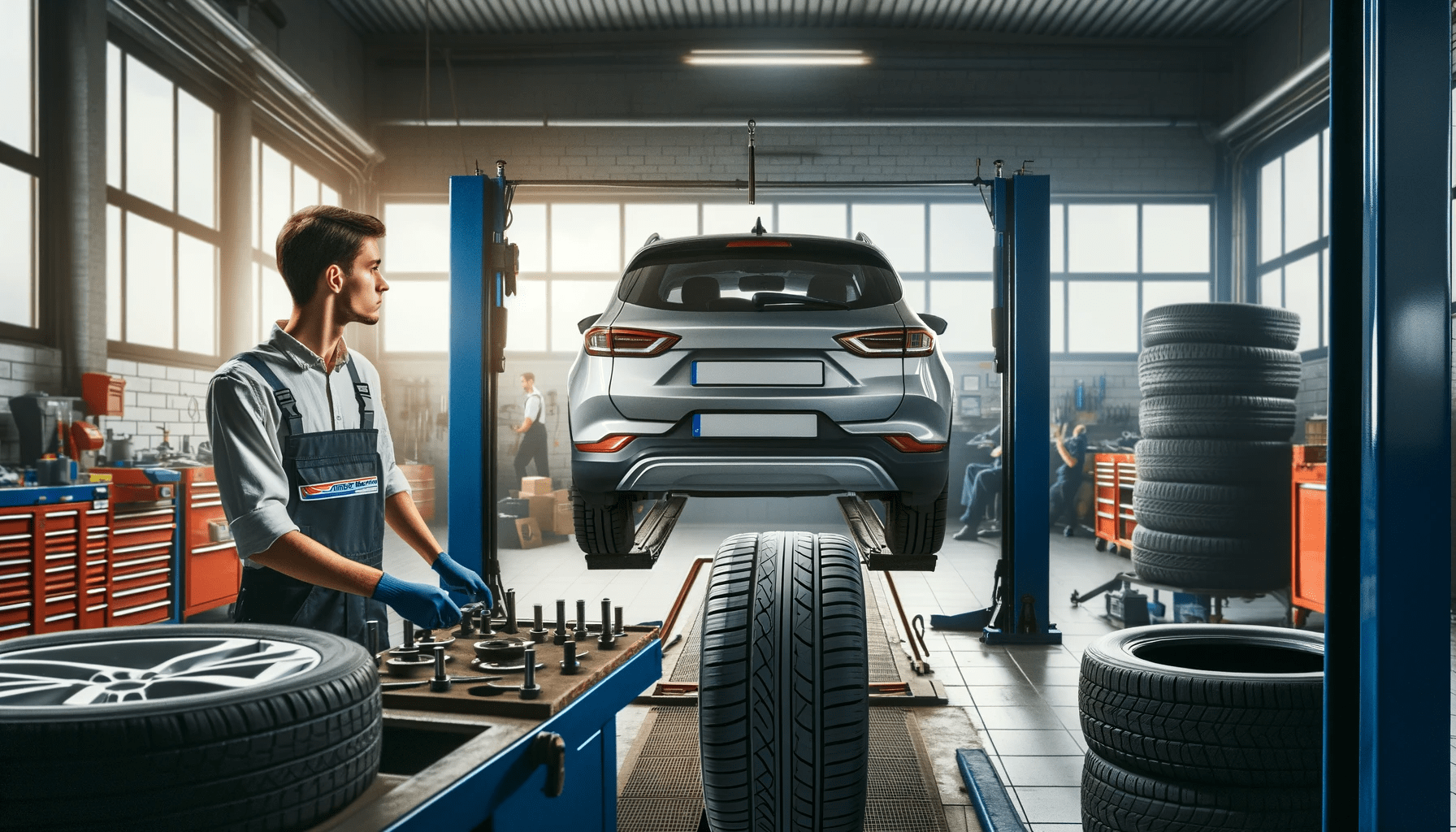Table of Contents
Benefits of Tire Rotations
Tire rotation is a fundamental aspect of vehicle maintenance that helps ensure even tire wear, improves handling, enhances fuel efficiency, and promotes overall vehicle safety. By periodically switching the positions of your tires, you can maximize their lifespan, maintain optimal traction, and reduce the long-term costs associated with tire replacements.
Key Takeaways
- Even Tire Wear: Regular rotation prevents excessive wear on specific tires, promoting longevity and stability.
- Improved Performance: Balanced tire wear leads to better handling and traction.
- Enhanced Fuel Efficiency: Reduced rolling resistance improves fuel economy.
- Increased Safety: Properly maintained tires provide better grip and reduce the risk of accidents.
- Cost Savings: Extending tire lifespan lowers the frequency of replacements, saving money over time.
Benefits of Tire Rotations
Ensuring Even Tire Wear
Tire rotation is crucial for preventing uneven tire wear, which can negatively affect performance and safety. In most vehicles, the front tires wear out faster than the rear due to the additional stress of steering and braking. By rotating tires at regular intervals, wear is evenly distributed, helping to extend their usable life.
Different types of drivetrain configurations affect how tires wear:
- Front-Wheel Drive (FWD): The front tires wear more quickly due to steering, acceleration, and braking forces.
- Rear-Wheel Drive (RWD): The rear tires experience more wear, but the front tires still suffer from steering forces.
- All-Wheel Drive (AWD): Even wear is critical since all four tires work together. Uneven wear can negatively impact traction and stability.
Regular rotation ensures that no single tire wears out significantly faster than the others, reducing the likelihood of premature replacement.

Improving Vehicle Performance
Tire rotation plays a direct role in maintaining balanced vehicle handling and traction. When tires wear unevenly, they can create performance inconsistencies, leading to poor cornering stability, vibration, and compromised grip.
Performance-oriented vehicles, in particular, benefit from regular tire rotation. For sports cars or high-performance sedans, uneven tire wear can lead to reduced responsiveness, negatively affecting the driving experience. Even wear ensures a predictable, smooth ride with optimal traction, making driving safer and more enjoyable.
Enhancing Fuel Efficiency
Tire rotation can have a significant impact on fuel efficiency. Evenly worn tires create less rolling resistance, meaning the vehicle requires less energy to move forward. Uneven tires increase friction, forcing the engine to work harder and consume more fuel.
By maintaining a consistent wear pattern, tire rotation helps improve mileage, leading to cost savings at the gas pump. This benefit is particularly noticeable for long-distance drivers and those who frequently drive on highways.
Increasing Safety
Tire rotation is an essential factor in ensuring maximum road grip and stability. When tires wear unevenly, they lose their ability to provide consistent traction, especially in challenging conditions such as rain, snow, or ice.
Worn-out front tires can reduce braking efficiency, while worn-out rear tires may cause oversteering or loss of control. By rotating tires regularly, drivers ensure that all four tires have equal levels of tread depth, improving stability and reducing the risk of hydroplaning or tire failure.
Cost-Effectiveness
One of the most practical benefits of tire rotation is the long-term cost savings it provides. Uneven wear can cause tires to wear out prematurely, leading to frequent replacements. Since tires are a significant investment, extending their lifespan through proper rotation helps reduce overall maintenance costs.
By delaying the need for new tires, regular rotation translates to direct financial savings while ensuring continued safety and performance.
Real-Life Example
Consider a high-performance sedan that frequently drives on winding roads. If the front tires are not rotated regularly, their outer edges will wear out faster due to the stress of turning and braking. Over time, this uneven wear reduces grip, making the car less stable in corners.
By implementing a routine tire rotation schedule, the wear is spread evenly across all four tires, ensuring a consistent and safe driving experience while maximizing the life of the tires.
Breakdown of Tire Rotation Benefits
| Benefit | Description | Impact on Vehicle |
|---|---|---|
| Even Tire Wear | Promotes uniform wear across all four tires. | Extends tire lifespan, improves stability. |
| Improved Performance | Balanced tire wear ensures predictable handling. | Enhances steering control and traction. |
| Enhanced Fuel Efficiency | Reduced rolling resistance leads to better mileage. | Lowers fuel consumption, reduces costs. |
| Increased Safety | Uniform tire wear prevents traction loss. | Improves grip, reducing accident risks. |
| Cost-Effectiveness | Extending tire lifespan delays replacements. | Saves money on frequent tire purchases. |
| Compliance with Warranties | Many manufacturers require regular rotation for warranty coverage. | Maintains warranty eligibility, preventing disputes. |
| Improved Comfort | Balanced tire wear reduces vibrations and noise. | Provides a smoother, quieter ride. |
Additional Benefits
- Prolonged Tire Life: Tires last longer when wear is distributed evenly, reducing the frequency of replacements.
- Warranty Protection: Many tire manufacturers require regular rotation as part of their maintenance guidelines to keep the warranty valid.
- Enhanced Driving Comfort: Balanced wear results in a smoother ride with reduced road noise and fewer vibrations.
Best Practices for Tire Rotation
To maximize the benefits of tire rotation, follow these guidelines:
- Follow Manufacturer Recommendations: Most vehicle manufacturers recommend rotating tires every 5,000 to 8,000 miles, but check the owner’s manual for specific guidelines.
- Use the Right Rotation Pattern:
- Front-to-Rear: Moving front tires to the back and vice versa for vehicles with non-directional tires.
- Cross-Rotation: Switching the front left tire to the rear right and front right to rear left, commonly used for AWD vehicles.
- Side-to-Side: Suitable for high-performance tires with staggered setups.
- Check Tire Condition: During rotation, inspect the tread depth, pressure, and signs of damage.
- Balance Tires When Needed: If there are noticeable vibrations after rotation, a wheel balancing service may be necessary.
Conclusion: The Importance of Tire Rotation
Tire rotation is a simple yet highly effective maintenance procedure that provides numerous benefits, including extended tire life, improved vehicle handling, better fuel efficiency, and enhanced safety. Regularly rotating tires not only helps optimize vehicle performance but also prevents premature tire wear and reduces overall maintenance costs.
By following a consistent rotation schedule and adhering to best practices, drivers can ensure their tires last longer, their vehicle remains stable, and their driving experience remains smooth and safe. Investing in routine tire rotation is a small effort that yields significant long-term rewards in performance, safety, and cost savings.
Additional Resources
Check out the best performance car gear available on the market.
